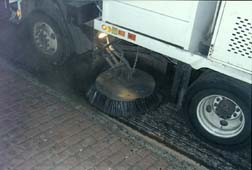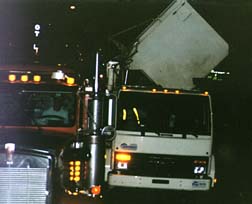Sweeping Up Milling Debris |
Roto-MillingPerhaps the toughest sweep of all.by Ranger Kidwell-RossPR Systems specializes in tearing up older asphalt pavement. This process, which is commonly termed 'roto-milling,' is done prior to replacing the road surface with new asphalt. Unlike many such companies, PR Systems runs sweepers of its own, rather than contracting out for sweeping up the old asphalt left behind the milling machines. 
"We've certainly used contractors, and still do sometimes," said Steve Yates, project manager for the Olympia, Washington-based company. "However we feel it's more cost-effective to do it ourselves. We started doing our own sweeping about 5 years ago, and for much of that time we fought with using older Mobil sweepers. We found that their skids tend to catch on the rough pavement surface encountered in milling operations. This tears up the equipment and also causes the sweeper to trail. Roto-Mill sweeping is a job for your most experienced operators."As far as I'm concerned, going behind a roto-mill is the hardest job of all for a sweeper or its operator. The sweeper has to be extremely heavy duty and in good condition, and the operator must have a high degree of competence. We've also seen a number of contractors try it with an air sweeper, and it just hasn't worked with any I've seen. "A big part of this kind of sweeping is having an operator who can keep track of what the roto-mill is doing throughout the complete process," asserted Frederickson. "That's the only way to do the professional kind of sweeping job that needs to be done. Without a high level of experience in roto-mill sweeping, an operator can create trouble for the whole crew. Also, it's important that the sweeper operator communicates with the milling crew as to how the particular operation is being run. You have to know what you're doing to start with, then listen well and follow along the guidelines. And your equipment has to be very rugged and in good condition. I also prefer using a high dump for ease of material transfer. It's difficult to pick the debris up from a big pile at the end of the day. However, there are a lot of high dump sweepers out there - especially single engine machines - that have a hard time handling millings because the material is so heavy. "Some of the [sweeping] contractors we see haven't had much exposure to roto-milling operations. They get out on the job and have no idea they'll be faced with piles of heavy material. I've seen operators not be able to keep up, or not realize when to get out of the cab and move material around with a shovel. Sometimes the asphalt just gets crunched back down and you have to get out and scrape it loose by hand. "Milling is an extremely heavy duty application and, especially on highway jobs where the paver is immediately following, an inefficient sweeper operator or a sweeper in poor shape will shut the whole process down. On those kinds of jobs, the sweeper simply has to keep up. That's why we won't consider a company with older sweepers or no backup unit in those types of high stress situations, unless they have a very strong track record with us. Overall performance is the key. In terms of equipment, I don't have a problem with someone with older sweepers if they're in good shape. It's always nice to see new, clean, efficient sweepers out there working, though. Then I know there is less of a chance for breakdowns and potential job slowdowns. "The fact is, we have several local sweeping contractors we work with who do a very good job for us - Everson Econo-Vac and Superior Sweeping, to name two. On the other hand, we've also had people show up with either inadequate equipment or an inexperienced operator, and before we know it we're paying for two sweepers when I know the job could be done with just one. Roto-milling is a unique application, and certainly not for beginners." Gale Holsman, owner of American Sweeping, Inc., has built a very successful sweeping operation - including sweeping after milling machines - in the Kansas City area. Perhaps not surprisingly, he thinks specialized sweeping contractors are the way to go, instead of a roto-mill company operating sweepers, too. "You cannot, as a road building company, operate your own sweeping equipment cheaper or better than we can do it for you," Holsman stated emphatically. "If the sweeper can't keep up, it can shut the whole crew down. The paving crew can work out ahead of the sweeper a certain percentage, but the sweeping team has to stay up with that percentage so the next process can be started. It's not the roto-mill you're staying up with, it's keeping up with the process. That's why our most experienced operators are the ones we send out on milling jobs. "We find the personality of the superintendent on the job makes a big difference. The crews have varied ways of doing things, where to put the stick down, whether they're coming right in with the asphalt the same day or not, or whatever the case may be. Not all crews asphalt the same day, that's why you ride around on roads that have those squiggles in them. They'll roto-mill a lot of the streets and then they'll come back with the asphalt crews some days later. "At American Sweeping, we have the variety of equipment that's needed and we are responsive. I'd estimate that 80% of our milling scheduling comes with less than 12 hours notice, so we have to be able to react. Our workload comes in at about 4:00 p.m. - for what needs to be done at 6:30 the next morning - because it's really dependent upon how much they got done today and how the weather's holding out, etc. For our part, we have to be able to say 'no problem.' We run a number of broom sweepers that are capable of doing this type of work, and also provide labor crews. I agree that sweeping after roto-mills is probably the toughest kind of sweeping out there: safety, traffic control, being alert, knowing the job - all are very important. There are a tremendous number of things going on in this type of work. You're not just dealing with the roto-milling, you're dealing with the entire process - the flaggers, the traffic and all the rest. You really have to be careful, and use properly trained people who have safety consciousness on their mind every second. It's also important to outfit your sweepers with proper safety equipment: big yellow lights flashing, construction signs on the back. Safety is a big part of the training our people have, and we outfit our sweepers so people can see us." David Sunshine is the owner of Maintech, Inc., a sweeping company located in the Denver area. Sunshine has been in operation for 8 years, runs a mechanical and an air sweeper division, and says that sweeping up after milling accounts for about 30% of his total business. He, too, agrees that it's a job for his most seasoned employees, and that paving contractors are better off using dedicated sweeping contractors than in doing the job themselves. "Where we are there are lots of environmental considerations to keep up with," said Sunshine. "As specialists, we're better equipped to do that. The job is also dangerous and that, too, calls for specialization. The sweeper operators have to be well trained and know all the tricks. If a sweeper breaks down, you've got to be able to have operators who, by and large, can fix it without calling in your mechanic. When that can't be done, you have to get your mechanical support people in real quick. 
"Primarily, the only type of sweeper you can use is a high dump. That's because the mill has a big conveyer belt that transports material up into dump trucks, and the dump trucks follow the mill. It's by far the best when you can dump into these same dump trucks, which means using a high dump. Once in awhile we use a big low dump air sweeper, and then pick up material with something like a front-end loader. That's the main reason we don't use it very often, even though it is a very powerful machine, but it does work great to clean up the fines. What we do with it is run it behind the mechanical brooms and pick up the fines. "Milling is still 90% a broom-only situation. However, the level of concern about air quality in Denver is one of the the highest in the country. That's because we have huge temperature inversions, which cause a brown cloud like L.A. is known for. It's primarily because they sand the streets so heavily during the winter. Perhaps even more importantly, in Denver they usually don't pave right after they mill. Instead, they leave the milled street or highway for several weeks while they finish the entire milling operation. Then they come back over it with the paving operation. The streets have to be cleaned - really cleaned - or the stuff picks up when people drive on it and breaks a lot of windshields and puts a lot of dust into the air. "That's why about 10% of our milling operations involve the using a big regenerative air street sweeper. You want a model with enormous power, something that can pick up the milling debris. More importantly, you need to pick up the fines a mechanical sweeper just can't, out of the deep pores of the milling operation. This is important for air quality reasons, and it is also important for the final 'tack' of the new asphalt onto the old surface. "Another consideration I'd offer to any other contractors who are looking at this type of work is that many of the projects are federal. This means you are required to have a certified payroll. This means your labor costs are higher, and the paperwork costs are more, too, than they are for regular sweeping. "Also, don't be fooled into thinking you can just put your best employee - somebody currently out sweeping parking lots in the middle of the night - into the completely intense situation that describes the typical milling job. Make no mistake, if you don't keep up with the milling crew, here's what will happen: The State officials, or whoever is monitoring the job, will shut the milling end of it down to let the sweepers catch up. One of their overriding concerns is to make sure that whatever traffic lanes had to be closed down are opened up in time for rush hour in the morning. If that happens, your customer will find themselves with a $600/hour mill sitting there waiting for you to catch up. Believe me when I say that cleaning up behind roto-mills is not like regular sweeping, and that you do not want to find yourself in that situation." This article is reprinted from American Sweeper magazine, Volume 6 Number 2. |
© 2005 - 2021 World Sweeper
|
Back to Milling Contents
|